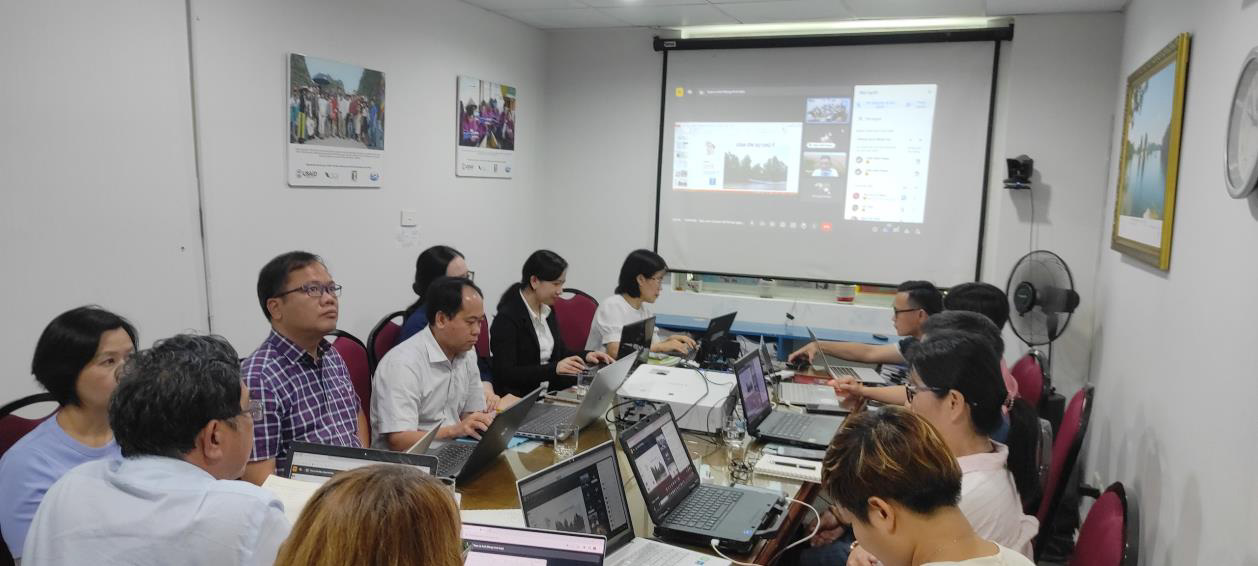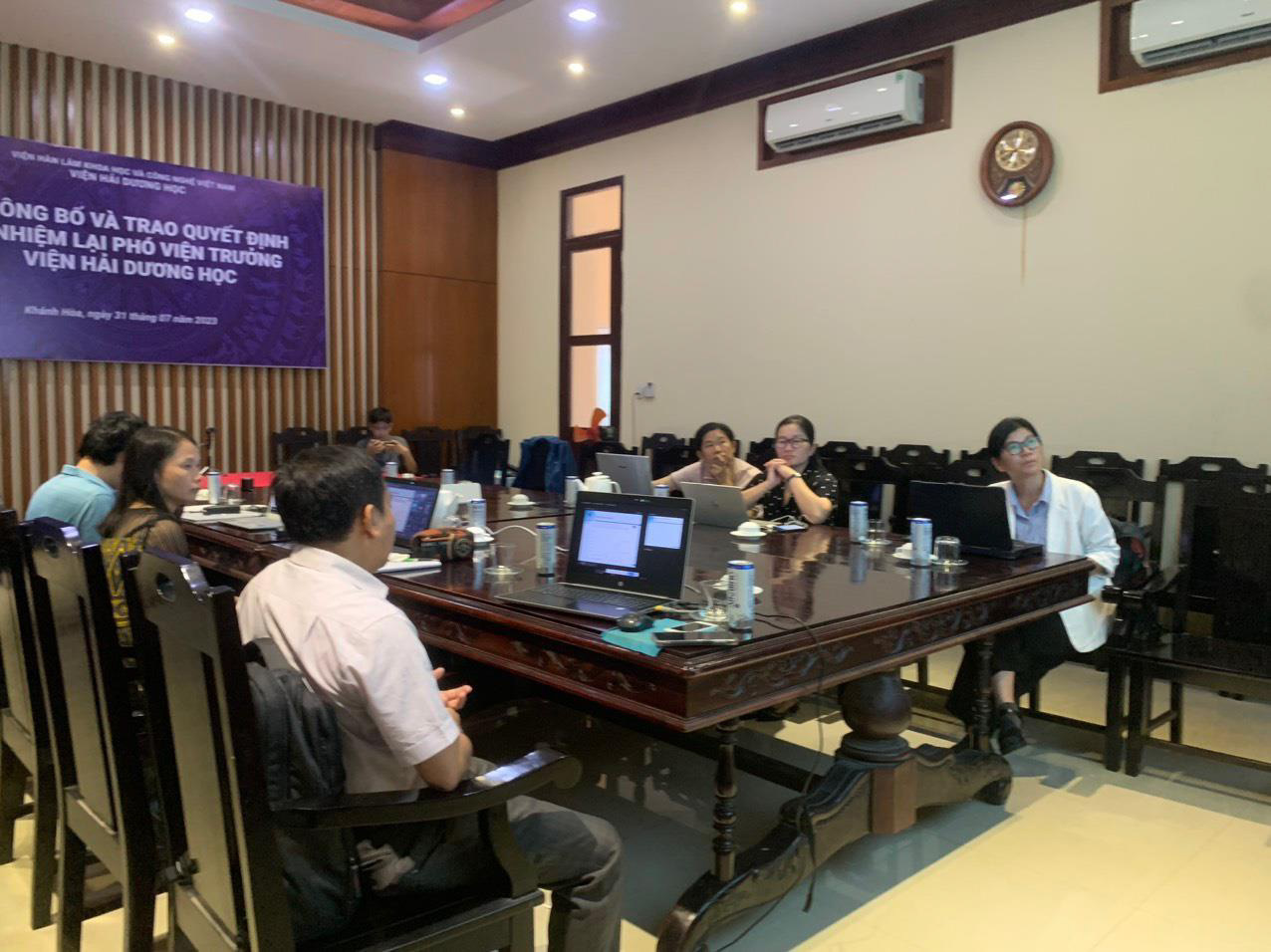September 2023 Video Introduction for the new course
The Video introduction for the course “Modeling marine environment is prepared.
The Video introduction for the course “Modeling marine environment is prepared.
A four-day training was held on June 30th – July via the online platform Zoom.
The interactive training aimed at introducing key aspects of “Information and Communications Technology” to the participants and had been delivered by the European partners of both the MARE and the URGENT project. The training contained the theoretical input by lecturers, practical group exercises for the participants and additional information and input from experts from the field of ICT. As part of the training, participants had been introduced to the topic of ICTs, their growing importance in society and academia as well as received detailed and in-depth knowledge on important and popular ICT methodologies (e.g., Geo- Information Systems, Lecture Recordings, Web-based Learning Platforms, etc.).
Specific objectives of the training were to strengthen capacities of participants and fellow project members, to enhance cooperation between partners and to provide specific scientific knowledge and examples on describing, using, and understanding ICTs. A particular focus lied on the rise of ICTs during the ongoing global pandemic and the lessons learned during this period.
See more: Online-Training on Information and Communications Technology (ICT)
A two-day training was held on August 19th – 20th, 2021 via the online platform Zoom.
The webinar provided participants the basic knowledge and skills necessary to use Xerte and Moodle to create and deliver their courses online for students. Following topics covered during the webinar:
• Creation of interactive content in Xerte
• Creation of interactive content using H5P
• Teacher dashboard in Moodle
• Formatting course material in Moodle
• Uploading and editing content in Moodle
• Forums and Assignments in Moodle
• Question bank in Moodle
• Quizzes in Moodle
• Enroll of Students and Communicate in Moodle
See more: Webinar -Learning Management System Training
A two-day training was held on August 9th -10th in the computer lab of Technology Building of Estonian University of Life Sciences.
4 sessions:
● E-learning session I: “How to create quizzes in Moodle”
● E-learning session II: “Possibilities of using the assignement tool in the Moodle courses”
● E-learning session III: “H5P – How to create interactive videos, quizzes and
presentations”
● E-learning session IV: “Various digital tools that can be used in teaching”
See more: e-learning training in Tartu
The European Commission support for the production of this publication does not constitute an endorsement of the contents which reflects the views only of the authors, and the Commission cannot be held responsible for any use which may be made of the information contained therein.
This project No. 610327-EPP-1-2019-1-DE-EPPKA2-CBHE-JP has been funded by Erasmus+ CBHE programme of the European Union.
Within the framework of the SUMARE Forum under the MARE Project, at 9:30 am on August 28,
2023 at the University of Natural Resources and Environment of Ho Chi Minh City, the thematic
report session “Tran De Gateway Port for the Mekong Delta” was presented by Mr. Doan Manh
Dung (Ho Chi Minh City Association of Science, Technology and Marine Economics).
The report took place in both face-to-face and online forms with the participation of a large
number of Experts, Scientists, Lecturers and students interested in the topic of the report.
MEETING CONTENT
Ms. Ho Yen Thu represented the Organizing Committee to welcome delegates and guests to the seminar, interact with participants and guests, and coordinate the meeting through the seminar program.
The Symposium seminar “Discussion on Manggro forest and Climate change response ” was presented by the Mare members and stakeholders, and it covers three topics:
– Topic#1: The role of the multiple forest ecology of Mui Ca Mau, a study given by Dr. Le Anh Tuan of the Can Tho University
– Topic#02: Community-based Forest protection model in Mui Ca Mau was presented by Ms. Le Hong Lien of subtainable rural development, Ha Noi
– Topic#03: Aquaculture under the mangrove canopy – a livelihood solution to adapt to climate change in Ca Mau was presented by Ms. Than Thi Hien of MCD, Ha Noi
Following the presentations of the Rapporteurs, the delegates and invited guests interacted, contributed suggestions, and asked the presenters questions. The discussion was moderated by Ms. Ho Thi Yen Thu

MEETING CONTENT
Dr. Huynh Vuong Thu Minh represented the Organizing Committee to welcome delegates and guests to the seminar, interact with participants and guests, and coordinate the meeting through the seminar program.
The Symposium seminar “Discussion on the Issue of Plastic Waste” was presented by the Mare mamer and Ph.D student, and it covers two topics:
– Topic#1: Typical marine ecosystems in coastal areas of Vietnam and the effects of plastic waste on ecosystems, a study given by MSc. Phan Minh Thu of the Nha Trang Institute of Oceanography
– Topic#02: Identification of microplastics in surface water and sediments of various watersheds in Can Tho City by a researcher was presented by Nguyen Truong Thanh of Can Tho University
Following the presentations of the Rapporteurs, the delegates and invited guests interacted, contributed suggestions, and asked the presenters questions. The discussion was moderated by Dr. Huynh Vuong Thu Minh.
1/ Participants at Nha Trang Institute of Oceanography’s Hall

UniKL has organized a Stakeholder Symposium consisting of panels from industry, academia and non-
governmental organizations. The objective of this symposium is to get and latest information and engagement
with the students and staff of all MY participants
